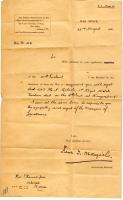Kerfies, Cleggies and all that.
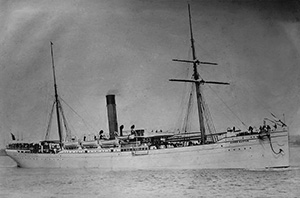 A Trip to South Africa
A Trip to South Africa
On 11 February 1900 Norman Roberts set off from Wrexham with The Royal Welch Fusileers to fight the Boers in South Africa. Here is his story told partly through a collection of his letters home and some other background information.
Background
Edward Ferdinand Norman Roberts was born in 1879 at Towyn Hall near Rhyl, the fifth child of Edward Roberts and Sarah Kerfoot. Known as Norman, he was baptised at Towyn on 5 March 1881. I don’t know where Norman went to school, but I get the feeling he was an educated but not necessarily academic young man. You can draw your own conclusions from reading his letters. His father was an attorney and his mother was the daughter of a well-to-do farmer so he would have had life chances.
He attended Church at Saint Mary’s, Towyn and was probably quite religious. I have a book which is inscribed:
Norman Roberts. For proficiency as the Catechising held in St Mary’s Church, Towyn during the year 1892. J. Thomson Jones, Vicar.
By 1891 the family were living at Foryd Lodge. I’m not just sure why they moved. I remember being told as a boy that the Hall burnt down, but it was certainly still standing in 1891 as it appears on the census with a John Powell and his wife living there. The Hall had stood where the Towyn-to-Rhyl road crosses the Chester & Holyhead Railway.
Foryd Lodge is called Towyn Lodge on the 1891 census but is fairly certain to be the same place as it appears together with Foryd Junction, the lifeboat cottage, Foryd Bridge and the Ferry Hotel on the census.
Norman’s father Edward has an entry in Slater's Directory of North & Mid Wales, 1895. In this publication it describes Towyn and lists some private residents, some commercial ones and some farmers and where they live. Edward Roberts is listed at Foryd Lodge at that time but in September 1897 when he died, his obituary says he died at Warren Road in Rhyl, having let Foryd Lodge.
At the start of 1900 Norman volunteered for war with the Royal Welch Fusileers. At that time, his Attestation says he was a shop assistant and we know from a newspaper report that he worked for Rhydwen Jones and Davies, a department store based in Llandudno but with a branch in Rhyl.
You may know the history of The Second Boer War or the South African War and, if not, you can easily read up about it. Tensions steadily built up over newly found gold and diamond resources but war started proper in October 1899. The British made a series of mistakes, were over confident, and generally messed up in the first phase and, not having much of an army at the time, went on a recruitment drive late that year which Norman Roberts presumably responded to.
10th February 1900
Norman wrote to his sister:
The Barracks
Wrexham
My Dearest Lily,
Just a line before I leave for the front. We are starting out at 4 o'clock tomorrow morning for Southampton where we will embark on the Doune Castle for South Africa. Be sure to write to me soon my number is 7347 RWF Volunteer Company, South Africa. That will find me. The Cavalry went off on Tuesday night. Johnny Jones and Walter Bell have gone with them. We are having a fine dinner before starting and also a grand breakfast at Birmingham on the way. I have had my photo taken in privates and also in khakis. Mother is going to send you one of me in private clothes. We had one of them taken in a group and had one given us. We are having nothing but snow here, it is about nine inches thick.
What do you think about the war? We have lost a lot of men over it haven't we? But things are looking better now, and I think we are going to the line of communication so we will not see much fighting. We have had splendid rig out: two suits, two of everything else except socks - we've had four pairs of those. We will have a lot of walking about I expect. I went home on Thursday to say goodbye to mother, and Sis, I am so sorry I cannot see you personally but be sure to write to me quite often. I will write to you again when we land and tell you all about the voyage. We are travelling as 3rd class passengers so we should not have a bad time of it; that is, if we have fine weather.
We shall not go out of the barracks today in case we are late for the train. I have nothing more to say just now.
I remain your loving Brother,
Norman 7347.
XXXXXXXXXXXXXXXXXX
I think he was quite fond of his sister Lilian. I’m sure he was fond of all his siblings. I sense a very positive and optimistic young man who cares a lot for his fellow men. Whilst not the most articulate letter writer, he's clearly interested in current affairs and is loyal to his country.
Home for Norman at that time was 8, East Parade, Rhyl where his mother and sisters Elizabeth and Medi kept a lodging house. That building is no longer there and the Hoxa Superstore now occupies the site. It would have been a prime position in its day, being at the end of the High Street and overlooking the sea and the pier.
He mentions Walter Bell in the letter. This is almost certainly his first cousin William Bell who served in the 29th (Denbighshire) Company 9 Battalion Imperial Yeomanry.
14th February 1900
A few days later he wrote again:
Castle Line
R.M.S. “Doune Castle”
Private Norman Roberts 7347
V. Company R.W.F.
Field Force
South Africa
My Dear Lily
Just a line to let you know that we have crossed the Bay of Biscay alright. We had a very rough twenty-four hours of it. Nearly everyone was seasick, but some were much worse than others. I was not so bad myself.
I have quite settled down now and am getting quite used to rough to bad weather. I got very wet yesterday the sea was washing all over her decks. She's a splendid boat. She rides the waves like a duck. We have a splendid food on board, chops and porridge for breakfast, three courses for dinner and four for tea. It seems funny: have nothing to see but water on every side. Sometimes we see ships passing in the distance. We have to get all our letters ready by tomorrow so that they will be ready by when we call at a coaling station which will be on Friday or Saturday.
We have a grand time of it on board, plenty of singing now that nearly all the fellows have got all right after their sea sickness. We have a cat that we are taking out with us. There are about 700 volunteers on board and last time she went out she had thirteen hundred regular soldiers on board. We had some tobacco given us by the Colonel. We all sleep in hammocks they are very comfortable, they swing with the motion of the ship. I saw a lot of fishes. They were something like seals only they were a kind of a yellowish colour.
I have nothing more to say just now but be sure to write to me. Have you had my photo yet? If you have not, write home for it as they have had them. I have nothing more to say just now. But I must conclude all with love and kisses.
I am your loving Brother,
Norman.
14-[2]-1900
Again, a very positive outlook… and a man who enjoys his food clearly! Although chops and porridge isn’t a combination I come across too often. The yellow fishes that look a bit like seals? Tuna maybe?
The Doune Castle was a 396 foot (120m) steam ship built in Glasgow in 1890.
4th March 1900
He wrote:
Steam Ship
Doune Castle
March 4th 1900
My Dear Lily
Just a few lines to let you know that we have had a safe and pleasant journey so far. We expect to arrive at the Cape tomorrow morning, but our letters have to be posted by 12 o'clock today. We should be stopping at Cape Town for a few days as all the troops are disembarking excepting the R.W.F. which will be going on to Durban which is about four days journey from the Cape. We stopped at Madeira for a few hours but it was in the night so we cannot tell what sort of a place it was. It looked alright at night, all the street lit up, and the place is on a hillside so it showed off all the night from the sea. It reminded me of Llandudno.
We have had all kinds of amusements on board cock fighting, pillow fighting, tug-of-war and racing and in the nights we have smoking, concerts and singing so the time has gone alright. We have had very fine weather all the way. We passed several steamers on the way and one of them brought us the news that Kimberley had been relieved. Of course, we were all very glad to hear that and we started a cheering. I am sure you could have heard it for miles and miles.
We crossed the equator on the 23rd of February. It was not as hot as I expected but it was a dull day and we had an awning all over the ship so that kept the heat from us a lot. The hottest day we have had was 100 degrees in the shade. We saw a lot of sharks one day and the officers shot one of them.
When we arrived at Madeira the natives came around us in small boats with all kinds of fruit but they were not allowed on board, so they had to smuggle it through the port holes. The sailors nearly drowned all of them with water that they threw at them … but they came in spite of everything.
The ship’s owners treated us to some oranges and bananas twice. It would come to a lot of money when there are about eight hundred of us on board. We have all had to wash our clothes, it was the hardest bit of work we have done since we were on board. We are fed very well; we have pudding every day. I have nothing more to say just now but be sure to write to me.
I remain your loving brother, Norman.
Food seems to be a theme again, but with touching concern for the ship owners at how much it cost them to provide fruit. I’ve always thought Madeira would be a nice place to visit. Now I’m thinking Llandudno would do just as well – at night anyway.
Diary of my trip to South Africa
Edward Ferdinand Norman Roberts
Norman also kept a diary, but sadly, he only kept it up until 2 March 1900. I wish he'd written more. The following few paragraphs are all he managed:
On Feb 11 at 4-15am we left the Wrexham barracks and arrived at Southampton at about 4-30pm. We then had some light refreshment. The boat The Doune Castle was a bit late owing to the bad weather the previous night. We embarked at 8-30. We then got the luggage on board which took about two hours. The steamer steamed out of the port at 10-30pm, Sunday. We had a very nice supper then we retired.
We were called up about 7 o’clock the next morning. We had nothing to do for the first few days until we got used to the sea. On Tuesday we got into the Bay of Biscay it was as rough as ever. We were nearly all sick but some had it much worse than others. About Thursday the weather had quite settled and we had nothing more but very fine weather until we got to the Cape.
On Feb 16 we arrived at Madeira and to a fresh supply of water and coal. There were about twenty small boats with fruit but they should not sell us any they were sent off the ship when they came on board but they did smuggle a few boxes of fruit. On the Sunday we had a church parade and the Welsh Guard sung in the service. We had some fruit given us from the ship owners. There was nothing much the next week but on one day we saw about 20 sharks and the officers shot one of them. On the second Sunday out we passed a steamer going to the Cape but she was much smaller than our boat and we soon left her. We had some sports on board cock fighting, pillow fighting and a tug of war, but the Welshmen were not lucky enough to take any of the prizes. Our officers then had cock fighting in which one of ours’ won the first prize.
On the 23 of Feb we crossed the equator, but it was not as hot as I expected but it was a dull day or then it would have been very hot.
We had an awning on the ship so we did not feel the heat as much. We passed one of the Castle boats on Thursday 2 March, but she did signal to us.
25th March 1900
This is the next time we can place Norman. He writes to his brother Jack (John Kerfoot Roberts). This letter seems unfinished so I'm not sure if it was sent with another or never sent at all. Modderspruit was just North-East of Ladysmith and had been a Boer hospital and makeshift railway station. It was taken back from the Boers on 1 March 1900.
Modderspruit Camp
March 25th 1900
My Dear Jack.
Just a few lines to let you know that we have arrived all right and are getting on. We had a very pleasant journey. We stopped at Cape Town for a couple of days. We went to Durban on board the Majestic.
21st April 1900
By now, Norman is back in Cape Town and whilst still cheery he's sounding a bit frustrated. It's interesting that the captain of the Majestic, the ship that took them from Cape Town to Durban, was Captain Edward Smith and his Deck officer was Charles Lightoller. Captain Smith later became captain of the Titanic. Charles Lightoller was the most senior officer to survive the sinking of the Titanic.
Howarden Castle
April 21st
False Bay
My Dear Lil.
I received your letter dated the March the ninth. I also had a letter from Mother and Jack. They were the first letters I had received since we landed on South Africa.
We had a very pleasant journey to Cape Town. We stopped there for four days and we enjoyed ourselves all right. I met Mr … Jones’ brother out there. We then embarked on the Majestic and proceded to Durban and then entrained for Ladysmith and, after a five hour ride, we arrived at Ladysmith.
You should have seen the Boer positions around Colenso. It is wonderful how our men ever took them. We had to get out of the train when we got to the Tugela River. It was an awful sight: the dead horses and graves for several miles around the river. I saw Lord Roberts’ son’s grave at Chieveley it had a very nice white stone on it.
The day after we got to Ladysmith we went to Modderspruit where we joined the regiment. We camped there for about a week or ten days and then we returned to a place about a mile from Ladysmith called Surprise Hill Camp. We were only there for a short time when we had orders that we were to go to Cape Town and, now we have got here, we do not know what we are going to do. We have been anchored in the bay for three days and now and there is no signs of getting off yet.
I was very glad of your letters especially as I had not had one from any of you. Be sure to write often. The soldiers seemed to think that this regiment will have no more fighting so I do not think we will see any fighting at all; but there are all kinds all rumours about, some that we are going home and others that we are going up country, but the officers themselves do not know where we are going yet.
The Lismore Castle sailed for England today. As she passed us several of the fellows wished they were on board. She is a hospital boat and had eight of our battalion onboard. I have no more time to write much more as it is nearly post time and I do not know if the mails will leave the boat again this week. We know very little of the war out here we get no papers except a few now and again from home.
I have nothing more to say just now but be sure to write soon.
I remain your loving brother, Norman.
8th May 1900
The next letter - to his mother this time - gives us a clue that he was at Dronfield around the beginning of May, so how long he was cooped up on the RMS Hawarden Castle, we don't know. Dronsfield is the area of Kimberley where DeBeers have a large diamond mine. From there they moved north and... well anyway, read on...
Fourteen Streams Camp
8th May 1900
My Dearest Mother,
I was very glad to receive your letter dated the 4th of April. We were then camping at Dronfield where I last wrote to you. The morning I had your letter we moved out about twenty miles by train to a small place called Windsorton Rd. We camped there in the open air for a few days and then started on a March up country. The first day we only went about 7 or 8 miles but the second we had it a bit harder, going about fifteen miles, and we had to cross two rivers which took us a long time as we had to help the transport across. Well the third was the greatest day of the lot as we had our first fight in South Africa on that day. It was on May 5th 1900. I shall never forget it as long as I live. We started from camp about 7 o’clock in the morning and marched about 5 miles and then we formed up in battle formation. They started to shell us at about 10 o’clock in the morning and our big guns soon answered. They make an awful noise.
I was just passing one of them as it fired. Well, I really thought my head was off with the noise and the earth shaking around the guns. We soon got used to the big guns fire alright. We could hear the shells going yards over our heads but there is no danger with them until they burst, and you can almost tell where they will drop so you have to keep well undercover.
Well, about 11 o'clock we were crossing a small open plane with no cover at all when they opened rifle fire on us. That frightened as a bit but every man kept well down and not one of us were hit. The next order was to advance, which we did in quick time. We were all down and in a ground trench in no time, and after that we had splendid cover all the way up, advancing in between bushes and stones all the way. We were not in the firing line, we were their support. As they lost their men we had to fill their places but they only lost six men and about eighteen wounded and that was just in the end. So, none of us got into the firing line though we were under very heavy fire until about half past four. So, you see, our first fight was rather a hard one. We soon got tea after that and our blankets and coats were soon there in the transport and we soon got down to rest.
I forgot to mention that the general complemented us very much and said we went to form up for battle first as if we were going to a parade. We are now camping at a place called Fourteen Streams. The Boers retired yesterday as we were turning up. They have blown the two ends of the bridge up. They say it is the largest in South Africa.
We are having splendid weather out here. The Boers lost around about twenty that we know of and about fifteen prisoners.
I have nothing more to say just now. With best love and kisses to yourself and all.
I remain your loving son, Norman.
P.S. It is our washing day today and think we shall have a small rest so I shall write again by the next mail. But if you do not get a letter you will know that we are on the move and cannot post them.
He seems much perkier after being shot at doesn't he? You never know how you will react in situations, but I can't even imagine going through that.
7th June 1900
From Fourteen Streams, they head north to Vryburg and on to Lichtenburg where he writes again to his mother.
Lichtenburg Camp
June the 7th
My Dearest Mother,
Just a few lines to let you know that I am all right. And still on the move. We have got our tents with us now. They are much more trouble, but it is well worth it as the nights are cold and sometimes very wet. We are now having a few days. Our last Big march was from Vryburg to here, a distance of one hundred and thirty miles which took us nine days. That’s not bad going considering we had to get the tents and everything like that ready. It was very wet last night but we were under cover all night. Some of the poor fellows must have got wet.
I went to the town yesterday and they are using the Post Office as a place for the Boers to go and give up their weapons. I saw several of them in a new suite of clothes and one of our officers asked him why they did not stick it to the end. They said they were afraid of killing all the English when we went into Vryburg. After looking around a bit we found a stores and he had some English cake. You should have seen the rush for it. We have got two days more rest and then we will be on the move for somewhere else. I received a nice long letter from Jack this morning which had started on April 27th so you can see it takes a long time to get to us. I expect there was great excitement when you heard the news of Pretoria being taken and all the prisoners relieved. You hear all those kind of things long before us as we are on the move, or they are all Dutch papers. We have had no more fighting, but our Cavalry killed nine blacks who were out looting.
We expect to be moving to Potchefstroom which is about ninety miles away south of Pretoria. They think if we get there we might be a move towards Cape Town.
I have nothing more to say just now but be sure and write soon.
With best love and kisses to yourself and all,
I remain your loving son E.F. Norman Roberts.
June is midwinter in South Africa of course. It sounds a bit tough going at times but, to me, Norman still manages to sound upbeat - even if he is missing a good read of the papers! Certainly, he sounds like he fancies a move back to the relative comforts of Cape Town after spending weeks in the field.
22nd August 1900
I'm sure there were more letters home, but the next communication I have is from the war office to Rev. J. Thomson Jones, the vicar who inscribed the book earlier:
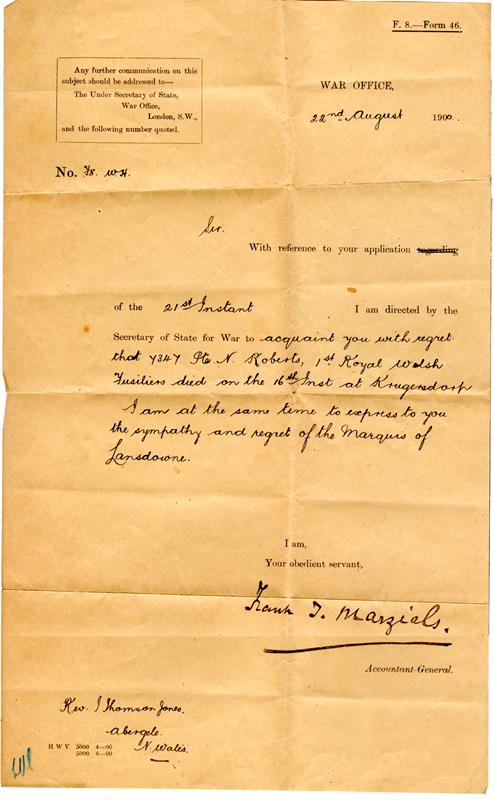
Norman was buried at Burgershoop Cemetery, Krugersdorp. Accounts vary, but he died of either heart disease or blood poisoning. We can speculate that it was sepsis, but we don't know for sure. Sad all the same.. and two days before his 21st birthday!
Private 7347 Norman Roberts is also mentioned on war memorials in Rhyl, St. Giles Parish Church, Wrexham, and Cardiff. He was awarded his South Africa Medal posthumously 1 April 1901.
He left behind: a metal chain, 11 shillings and sixpence in a leather purse and a prayer book.
I don't have any of those items but I do have his bible - written in Welsh - that was given to him by his brother Jack.
An acquaintance of Norman, Lieutenant Hatherley Jones of Rhyl, wrote a while later in January 1901:
..."they informed me...that poor Norman Roberts had died of blood poisoning and was buried in the Cemetery at Krugersdorp. I was quite upset, as he was the younger son of the late Mr Edward Roberts, Solicitor, Rhyl (my late respected principal) I visited his grave, and found a beautiful white cross had been erected at the head, subscribed for by his fellow Rhylites. His death must have been a sad blow to his widowed mother and the family, and I'm sure we all sympathise with them. He was so promising and popular. There is only one consolation namely that he died as truly for his sovereign and country as if he died on the battlefield."
A mention from David Lloyd George
Back in Rhyl shortly after Norman's death, David Lloyd George was campaigning for the 1900 snap election - "The Kharki Election" as it was called. On 29 September, this report appeared in the Rhyl Record and Advertiser:
Rhyl sent more volunteers to the South Africa War than any other town in the county, and several of them have already died from disease there, among them Private Norman Roberts, the son of one of the oldest and most respectable families in this town, being the youngest son of the late Mr Edward Roberts, Solicitor. It was our duty a few weeks ago to announce his death, but it has been left to Private Langton, of Carnarvon to tell the tale of the horrible neglect and cruelty which caused his death. Mr Lloyd George dealt with the matter in the following trenchant remarks on Tuesday night. "A Carnarvon man — George Langton, I. Company of the Volunteers (cheers) — wrote to his parents that the country in which they were fighting was not worth theepence. A hundred millions was a nice price to give for it (cheers). Langton wrote that one of the volunteers — Norman Roberts, Rhyl — had been ailing for some time. The doctor told him to stop howling, and asked "Why didn't you report yourself sick." Turning to the colour sergeant, he said "If this moaner recovers enough by morning, make him a prisoner." (shame). Instead of looking at that man the doctor ordered him to be sent to the hospital and while on the road there he died (shame). No wonder Mr Chamberlain wanted his majority before the soldiers came back, and then for six years he could run his powder factories and his H skins and Son" (cheers). Colonel Howard is a supporter of the government who sent out volunteers to be treated like this. Will the people of Rhyl support such a candidate?
Lloyd George was an opponent of the war in South Africa and was critical of the government awarding contracts for arms supplies to their cronies, the Chamberlain family, while other, much lower tenders, were rejected. Allowing for some political bluster, it does give us an idea of the circumstances of Norman's demise.
Links.
- Edward Ferdinand Norman Roberts – his timeline and his family.
- Map – Showing Norman's travels and places visited.
- Letter from Norman to Lilian, 10 February 1900 – Scan and transcript (1.2Mb PDF file)
- Letter from Norman to Lilian, 14 February 1900 – Scan and transcript (1Mb PDF file)
- Letter from Norman to Lilian, 4 March 1900 – Scan and transcript (1.5Mb PDF file)
- Letter from Norman to Jack, 25 March 1900 – Scan and transcript (448Kb PDF file)
- Letter from Norman to Lilian, 21 April 1900 – Scan and transcript (1.1Mb PDF file)
- Letter from Norman to his mother, 8 May 1900 – Scan and transcript (1.6Mb PDF file)
- Letter from Norman to his Mother, 7 June 1900 – Scan and transcript (813Kb PDF file)
- Norman's short-lived diary – Scan and transcript (1.5Mb PDF file)
- The Royal Welch Fusiliers – Page of the National Army Museum
- The Second Boer War – Wikipedia page describing the war.
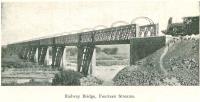
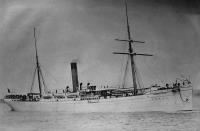
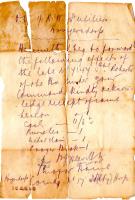
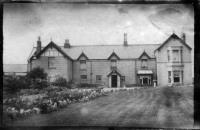
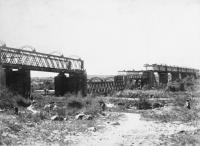
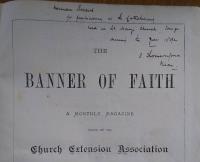
-0200-0160.jpg)
